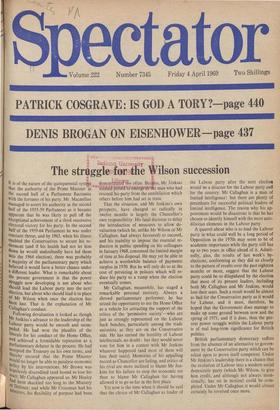incilana Univerity The stroggledfonthe Wilson succession With the fortunes of
his party. Mr. Macmillan others before him had set in train.
Orement (and if his health had not let him down he would undoubtedly have led them into the 1964 election), there was probably a majority of the parliamentary party which believed it would have a better chance under a different leader. What is remarkable about the present government is that the power struggle now developing is not about who should lead the Labour party into the next election, but about who should lead it in place of Mr Wilson when once the election has been lost. That is the explanation of Mr Callaghan's conduct. Following devaluation it looked as though Mr Jenkins's advance to the leadership of the Labour party would be smooth and unim- Peded. He had won the plaudits of the liberals for his conduct of the Home Office, and achieved a formidable reputation as a Parliamentary debater in the process. He had accepted the Treasury on his own terms, and thereby ensured that the Prime Minister Would no longer be able to paralyse economic rlicY by his interventions. Mr Brown was tonelessly discredited (and bound to lose his eat); Mr Callaghan appeared so. Mr Healey nid been shackled too long to the Ministry duction in public spending on his colleagues in January 1968, consumed the limited margin of time at his disposal. He may yet be able to achieve a worthwhile balance of payments surplus in 1970. But he will only do so at the cost of persisting in policies which will re- duce his party to a rump when the election eventually comes.
Mr Callaghan, meanwhile, has staged a remarkable personal recovery. Always a shrewd parliamentary performer, he has seized the opportunity to use the Home Office as a vehicle for attracting the support of the critics of the 'permissive society'—who are just as strongly represented on the Labour back benches, particularly among the trade unionists, as they are on the Conservative side. He has earned the hostility of Labour intellectuals, no doubt : but they would never vote for him in a contest with Mr Jenkins whatever happened (and most of them will lose their seats). Memories of his appalling record as Chancellor are fading, and critics of his rival are more inclined to blame Mr Jen- kins for his failure to stop the economic rot than to blame Mr Callaghan for having allowed it to go so far in the first place.
Yet now is the time when it should be said that the choice of Mr Callaghan as leader of the Labour party after the next election would be a disaster for the Labour party and for the country. Mr Callaghan is a man of limited intelligence : but there are plenty of precedents for successful political leaders of limited intelligence. The reason why his ap- pointment would be disastrous is that he has chosen to identify himself with the most ante- diluvian elements in the Labour party.
A quarrel about who is to lead the Labour party in what could well be a long period of Opposition in the 1970s may seem to be of academic importance while the party still has up to two years in office ahead of it. Admit- tedly, also, the results of last week's by- elections, conforming as they did so closely to the pattern of results over the past eighteen months or more, suggest that the Labour party could be so dilapidated by the election that most of its present leaders, including both Mr Callaghan and Mr Jenkins, would lose their seats. Such a result would be almost as bad for the Conservative party as it would for Labour, and it must, therefore, be hoped that the Government does manage to make up some ground between now and the spring of 1971; and if it does, then the pre- sent power struggle within the Labour party is of real long-term significance for British politics.
British parliamentary democracy suffers from the absence of an alternative to govern- ment by the Conservative party which can be relied upon to prove itself competent. Under Mr Jenkins's leadership there is a chance that the evolution of Labour into a modern social democratic party (which Mr Wilson, to give him credit, and although not always inten- tionally, has set in motion) could be com- pleted. Under Mr Callaghan it would almost certainly be reversed once more.


































